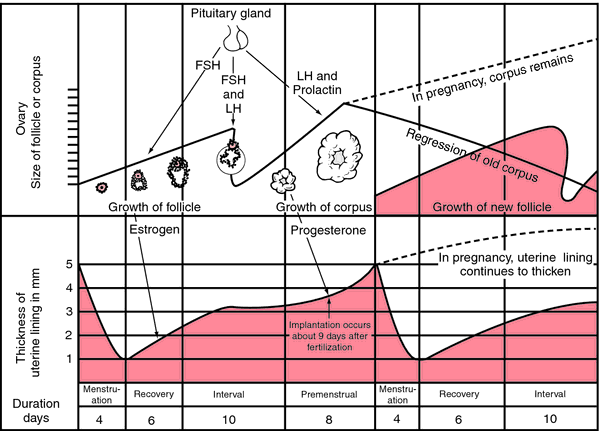Medical term:
menstrual
menstrual
[men´stroo-al]pertaining to menstruation.
menstrual cycle the regularly recurring physiologic changes in the endometrium that culminate in its shedding (menstruation). Menstrual cycles vary in length, with the average being about 28 days. The length of time of menstrual flow is also variable, with an average of about 5 days. Women menstruate from puberty to menopause, except during pregnancy. The first 14 days of the cycle are called the follicular phase; a follicle containing an ovum is developing in one of the ovaries. It begins as the menstrual flow ceases; the lining of the uterus is stimulated by estrogen and begins to increase in thickness to prepare for the possibility of reproduction. On the twelfth or thirteenth day of the cycle, the ovulatory phase begins with a surge in levels of luteinizing hormone and follicle-stimulating hormone; ovulation then takes place and the ovary discharges the ovum. The ruptured follicle is transformed into a yellowish material called the corpus luteum; the luteal phase begins as the corpus luteum secretes progesterone. Progesterone acts on the endometrium, building up tissues with an enriched supply of blood to nourish the future embryo. If fertilization and conception do not take place, the estrogen level in the blood falls, the endometrium is no longer stimulated, and the uterus again becomes thinner. Blood circulation slows, blood vessels contract, and the menstrual phase begins; unused tissue breaks down into the bloody discharge known as menstruation. The cycle then starts again.

Average 28-day menstrual cycle. The cycle begins when hormones from the pituitary gland stimulate the development of an egg in a follicle inside one of the ovaries. About the fourteenth day, ovulation occurs: The follicle bursts, and the egg is discharged from the ovary. If the egg is not fertilized, the cycle ends in menstruation on the twenty-eighth day. If the egg is fertilized, pregnancy begins.
Miller-Keane Encyclopedia and Dictionary of Medicine, Nursing, and Allied Health, Seventh Edition. © 2003 by Saunders, an imprint of Elsevier, Inc. All rights reserved.
men·stru·al
(men'strū-ăl), Avoid the misspelling/mispronunciation menstral.Relating to the menses.
[L. menstrualis]
Farlex Partner Medical Dictionary © Farlex 2012
menstrual
(mĕn′stro͞o-əl) alsomenstruous
(-əs)adj.
1. Of or relating to menstruation.
2.
a. Taking place on a monthly basis.
b. Lasting for one month.
The American Heritage® Medical Dictionary Copyright © 2007, 2004 by Houghton Mifflin Company. Published by Houghton Mifflin Company. All rights reserved.
menstrual
adjective Referring to menstruation, see there.Segen's Medical Dictionary. © 2012 Farlex, Inc. All rights reserved.
men·stru·al
(men'strū-ăl)Relating to the menses.
Synonym(s): emmenic.
Synonym(s): emmenic.
[L. menstrualis]
Medical Dictionary for the Health Professions and Nursing © Farlex 2012
Word not found in the Dictionary and Encyclopedia. Did you mean:
- Minstrels
- menstrual
- Monastrals
- menstrua
- minstrelsy
- Ministerials
- Ministeriales
Latest Searches:
Voraxaze - Voranil - Voorhoeve - voodoo - VOO - Vontrol - von - vomitus - vomiturition - vomitory - vomitoria - vomito - vomitive - vomiting - vomit - vomica - vomerovaginalis - vomerovaginal - vomerorostralis - vomerorostral -
- Service manuals - MBI Corp